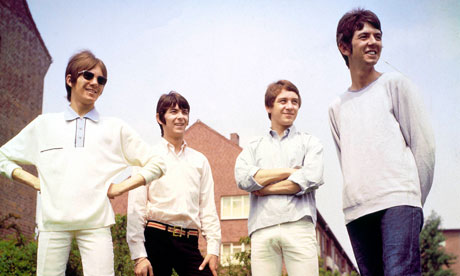
Sanjeev Bhaskar used to play an old man in Goodness Gracious Me who insisted that every major public figure was Indian. Paolo Hewitt is a bit like that with mod. In his introduction he argues that Mean Streets, American Psycho, hip-hop and acid house are all "totally mod". Presumably this is the same Paolo Hewitt who, a few lines earlier, stated: "For me, mod began in 1958 and ended in 1963", but the apparent contradiction raises the important question of why this youth movement that flourished in that curious rock'n'roll interregnum between Elvis's subscription and the Beatles' first album should remain so inspiring, via sporadic revivals, that Paul Weller would speak for many, 30 years on, when he said: "It's like a religion. It's my code, it gives something to my life." (The book's foreword comes from a fellow true believer, actor Martin Freeman.)
Mod's early days were caught in amber by Colin MacInnes's 1959 novel Absolute Beginners, whose title conveniently makes it the opening entry here. It depicted the hip modernist (not the Gertrude Stein kind) flitting between jazz gigs and coffee bars on his Italian scooter. Like MacInnes's narrator, mods drew their music from black America and their style and philosophy from the continent. The scene developed according to a strict aesthetic: scooters over motorbikes, speed over weed, looking good over everything else. The most famous definition of mod came several years later from Pete Meaden, the man who once managed the Who: "Clean living under difficult circumstances."
Meaden's resonant phrase merits unpacking. To him, the mods' conspicuous consumption was a form of defiant working-class aspiration, while to another early mod, Steve Sparks, it was spawned by art school beatniks. There are many aspects to debate, but this is not a book that sets out to debate them. It reads like a series of unedited Wikipedia entries, larding received wisdom with matey cliches. People are always "shooting to fame" from "humble beginnings", before "growing old Modfully" or dying and going to "Mod heaven". The ideal reader is either a middle-aged man keen to spend an afternoon waxing nostalgic about Quadrophenia and Vespas, or an undercover police officer planning to infiltrate a mod cartel and looking for the right names to drop. Anyone else will find a lot of what and no why.
And yet the authors' straightforward cataloguing of bands and brands does tell you something about this most fetishistically materialistic of youth cults by showing how the mod's-eye can verge on myopia. The wider world registers only sporadically: JFK appears because mods liked his haircut and the Korean war gets a mention for introducing the M-51 fishtail parka. Beloved artforms are shortchanged by curious emphasis. You would think from these entries that Miles Davis was a dapper dresser who played a bit of trumpet and that À bout de souffle was chiefly notable for the way Jean-Paul Belmondo held his cigarette.
The mods certainly treasured music, whether it be jazz, ska, r'n'b or soul, but also the cultural capital that came from owning the rarest, most desirable discs. When Roger Eagle, resident DJ at Manchester's Twisted Wheel, saw the Rolling Stones entering the club in 1963 he taunted them by playing, in sequence, every song they had covered on their debut album – "a brilliant mod put-down," say the authors. It's certainly funny but it suggests a man who couldn't see the wood because he was too busy flaunting his in-depth knowledge of the trees.
The mods' belief that looking good was practically a moral virtue could be, the authors acknowledge, their achilles heel. A 1965 anti-smoking ad (one of the many fascinating archive images that are the book's main attraction) encourages readers of Rave magazine to quit in order to spend the money saved on fab mod gear. Notorious rock manager Don Arden gave the Small Faces accounts in every boutique on Carnaby Street so that when they asked him about royalties he could claim they'd spent them all on clothes. You suspect Hewitt and Baxter would have been easy meat for Arden. Entry by entry, their relentless attention to the external details at the expense of the deeper resonances hinted at by Paul Weller begins to remind you of someone. So it's true. Patrick Bateman in American Psycho is indeed "totally mod".
Dorian Lynskey is the author of 33 Revolutions Per Minute (Faber)

